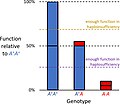Haploinsufficiency: Difference between revisions
CSV import Tags: mobile edit mobile web edit |
CSV import |
||
| Line 17: | Line 17: | ||
[[Category:Genetic disorders]] | [[Category:Genetic disorders]] | ||
{{medicine-stub}} | {{medicine-stub}} | ||
<gallery> | |||
File:Haploinsufficiency_graph_only.jpg|Haploinsufficiency graph only | |||
</gallery> | |||
Latest revision as of 21:38, 23 February 2025
Haploinsufficiency is a genetic condition that occurs when a person has only one functional copy of a gene, rather than the usual two copies. This can lead to a variety of health issues, as the remaining copy of the gene may not produce enough of the necessary protein for normal function. Haploinsufficiency can be inherited in an autosomal dominant manner, meaning that a mutation in one copy of the gene is enough to cause the condition.
Symptoms of haploinsufficiency can vary depending on the specific gene involved and the extent of the deficiency. In some cases, haploinsufficiency may be asymptomatic or cause only mild symptoms. However, in other cases, it can lead to more severe health problems, including developmental delays, intellectual disabilities, and an increased risk of certain medical conditions.
One example of a condition caused by haploinsufficiency is Williams syndrome, a rare genetic disorder that affects multiple systems in the body. Individuals with Williams syndrome typically have distinctive facial features, cardiovascular abnormalities, and intellectual disabilities. This condition is caused by a deletion of several genes on chromosome 7, leading to haploinsufficiency of those genes.
Treatment for haploinsufficiency depends on the specific gene involved and the associated health issues. In some cases, supportive care and management of symptoms may be the main approach. However, for certain conditions, targeted therapies or gene replacement strategies may be possible to address the underlying genetic defect.
Research into haploinsufficiency and its implications for human health is ongoing, with scientists working to better understand the mechanisms involved and develop potential treatments. By studying the effects of gene dosage on cellular function, researchers hope to uncover new insights into the genetic basis of various diseases and conditions.
For more information on related topics, please refer to the following articles:
-
Haploinsufficiency graph only

